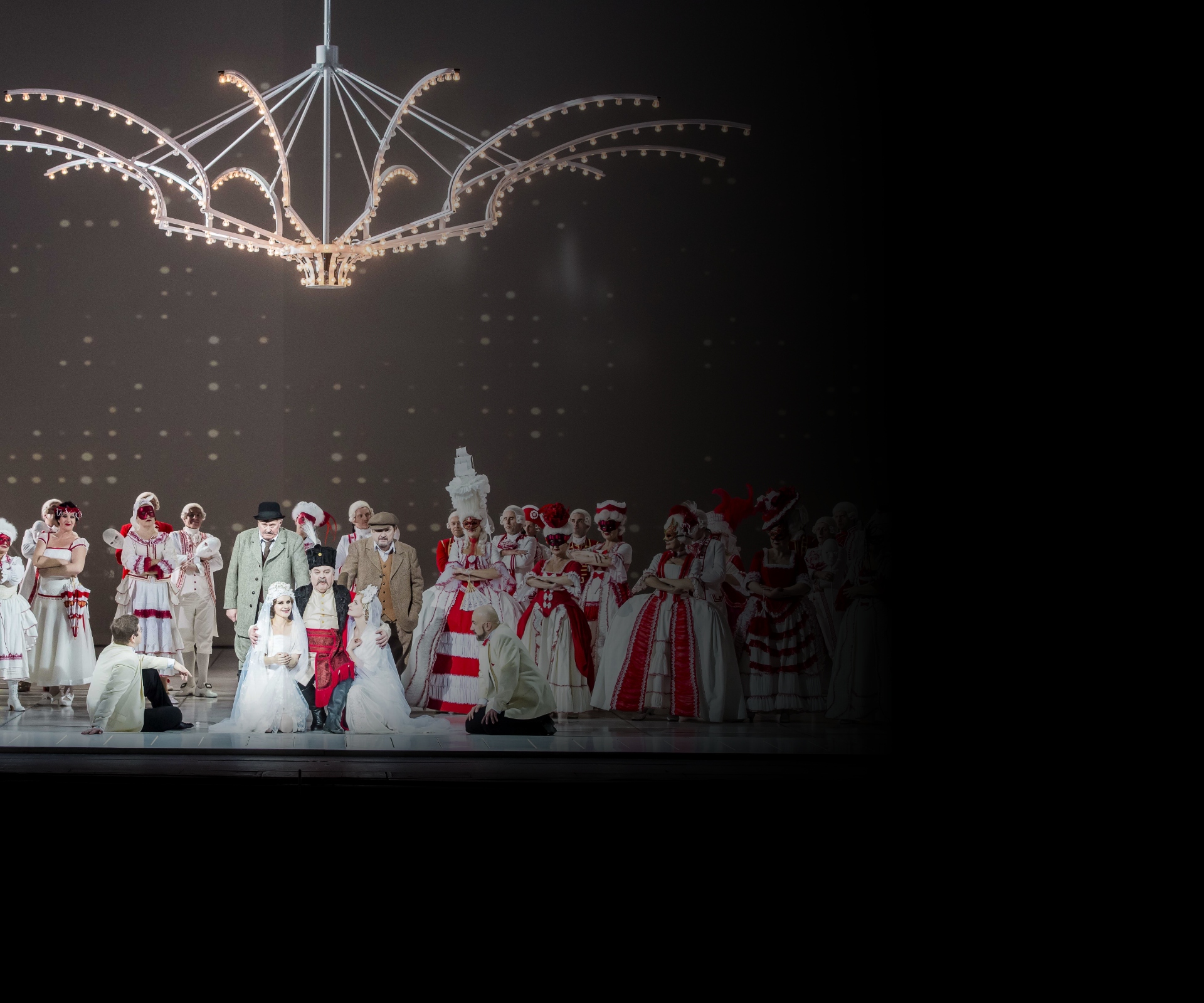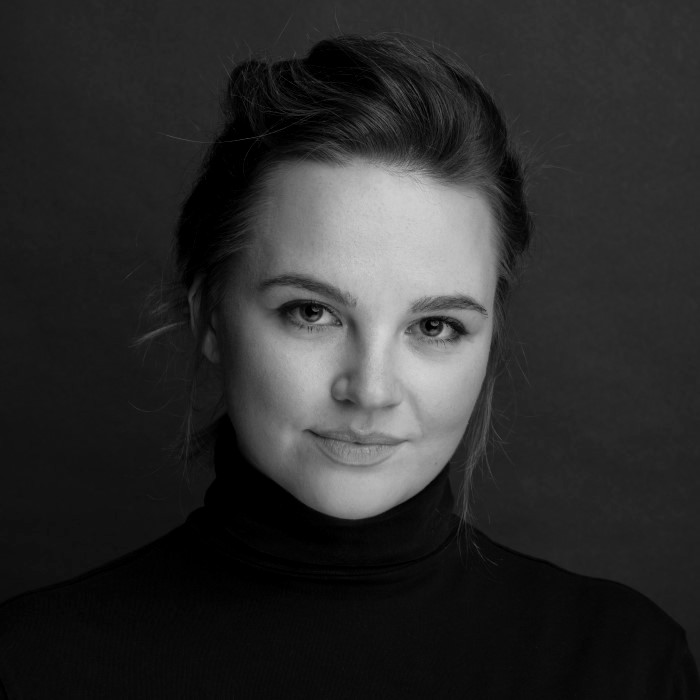The Haunted
Manor
Stanisław Moniuszko
Opera in four acts
Libretto: Jan Chęciński
World premiere: 28 September 1865, Teatr Wielki, Warsaw
Premiere of this production: 8 November 2015, Polish National Opera, Teatr Wielki, Warsaw
In the original Polish with English surtitles
The Haunted Manor by Stanisław Moniuszko comes from the catalogue of PWM Edition
Even though The Haunted Manor is considered Moniuszko’s most remarkable work, it is still hard to fathom the fact that the opera has been put before the Warsaw public over 1,500 times already. Written after Poland had been wiped from the map of Europe, the masterpiece enabled the desolate nation to go on a sentimental journey back to the time when its motherland was self-governing and free from external peril. A praise for family and native traditions evoking the happy days of yore won the hearts of the Polish audience yearning for its heritage. Before the tsarist censors realised the opera had been written to lift the Poles’ spirits and banned it after the third show in 1865, large portions of the public had managed to see the production and spread the word about the hope of restoring freedom that it offered. Unfortunately, Moniuszko did not live to see the next staging. A hundred years since its world premiere, the opera opened the first season at the newly restored Warsaw opera house following its destruction during the Second World War. It was no coincidence: in the course of the intervening decades The Hunted Manor became a symbol of Polish patriotism, Poland, and the strength of her nation that has risen from ashes many times it its history.
It is also no surprise that this very Polish work was for years staged exclusively by Polish directors. In 2015, however, a British name was listed under ‘director’ in the credits of the Polish National Opera’s new production of The Haunted Manor. David Pountney, prominent regisseur and director of leading opera festivals and houses, had previously staged The Passenger and William Tell for the company. Fascinated by the mentality of the nations from behind the iron curtain, he accepted the challenge of staging the Moniuszko work on the familiar stage of the Warsaw opera house, equipped with his typical passion and commitment.
In Pountney’s opinion, Moniuszko deliberately set his opera in the 18th century as it had been the last period when Poland was independent before its collapse. That is why the British director moved his take on The Haunted Manor to another time of respite from historical turmoil, the 20th-century interwar period.
While enjoying the atmosphere of the 1920s and 1930s with the escapism, hedonism, and gaiety inspired by the recovery of Poland’s sovereignty in 1918 pervading Pountney’s production, you cannot help but sense the looming spectre of the apocalypse to be brought on by the Second World War.
David Pountney approached the Moniuszko opera in a light and tongue-in-cheek manner. The love intrigue unfolds in the circles of Poland’s culturally thriving intelligentsia and nobility. It moves and amuses, although hinting that the atmosphere of carefreeness and joie de vivre may end as quickly as it started. The production prompts one to reflect on historic recurrence and the fact that nothing – not even the most fundamental things – should ever be taken for granted. The score is truly beautiful, charming, and pleasant. The middle acts enchant with the crystal-clear beauty of its ensembles, while the well-executed concept of connecting the different pieces together with recitatives very successfully propels the dramatic pace forward.
Cast
Credits
Synopsis
Sponsors
-
Partnerzy Akademii Operowej
-
Partnerzy Teatru Wielkiego - Opery Narodowej
-
Partner technologiczny
-
Patroni medialni






![[Translate to English:] fot. / photo: Krzysztof Bieliński [Translate to English:] fot. / photo: Krzysztof Bieliński](/fileadmin/_processed_/a/c/csm_BIEL1013_g_00605711bb.jpg)
![[Translate to English:] fot. / photo: Krzysztof Bieliński [Translate to English:] fot. / photo: Krzysztof Bieliński](/fileadmin/_processed_/2/c/csm_BIEL1048_g_4950cd9fdc.jpg)
![[Translate to English:] fot. / photo: Krzysztof Bieliński [Translate to English:] fot. / photo: Krzysztof Bieliński](/fileadmin/_processed_/8/5/csm_BIEL1056_g_dece2eb0e3.jpg)
![[Translate to English:] fot. / photo: Krzysztof Bieliński [Translate to English:] fot. / photo: Krzysztof Bieliński](/fileadmin/_processed_/6/3/csm_BIEL1068_g_73ff8e6405.jpg)
![[Translate to English:] fot. / photo: Krzysztof Bieliński [Translate to English:] fot. / photo: Krzysztof Bieliński](/fileadmin/_processed_/3/2/csm_BIEL1098_g_b834dbbe6a.jpg)
![[Translate to English:] fot. / photo: Krzysztof Bieliński [Translate to English:] fot. / photo: Krzysztof Bieliński](/fileadmin/_processed_/c/c/csm_BIEL1099_g_ff12b3ec37.jpg)
![[Translate to English:] fot. / photo: Krzysztof Bieliński [Translate to English:] fot. / photo: Krzysztof Bieliński](/fileadmin/_processed_/1/5/csm_BIEL1123_g_11cd23830e.jpg)
![[Translate to English:] fot. / photo: Krzysztof Bieliński [Translate to English:] fot. / photo: Krzysztof Bieliński](/fileadmin/_processed_/3/1/csm_BIEL1155_g_1dd36f0b25.jpg)
![[Translate to English:] fot. / photo: Krzysztof Bieliński [Translate to English:] fot. / photo: Krzysztof Bieliński](/fileadmin/_processed_/f/2/csm_BIEL1179_g_b20292260b.jpg)
![[Translate to English:] fot. / photo: Krzysztof Bieliński [Translate to English:] fot. / photo: Krzysztof Bieliński](/fileadmin/_processed_/7/a/csm_BIEL1319_g_4a72850bb7.jpg)
![[Translate to English:] fot. / photo: Krzysztof Bieliński [Translate to English:] fot. / photo: Krzysztof Bieliński](/fileadmin/_processed_/2/7/csm_BIEL1325_g_91b149772e.jpg)
![[Translate to English:] fot. / photo: Krzysztof Bieliński [Translate to English:] fot. / photo: Krzysztof Bieliński](/fileadmin/_processed_/3/6/csm_BIEL1363_g_faf78985ad.jpg)
![[Translate to English:] fot. / photo: Krzysztof Bieliński [Translate to English:] fot. / photo: Krzysztof Bieliński](/fileadmin/_processed_/0/6/csm_BIEL1382_g_1a52ac9854.jpg)
![[Translate to English:] fot. / photo: Krzysztof Bieliński [Translate to English:] fot. / photo: Krzysztof Bieliński](/fileadmin/_processed_/9/0/csm_BIEL1415_g_678e772a7e.jpg)
![[Translate to English:] fot. / photo: Krzysztof Bieliński [Translate to English:] fot. / photo: Krzysztof Bieliński](/fileadmin/_processed_/9/1/csm_BIEL1429_g_ded8e81045.jpg)
![[Translate to English:] fot. / photo: Krzysztof Bieliński [Translate to English:] fot. / photo: Krzysztof Bieliński](/fileadmin/_processed_/2/5/csm_BIEL1436_g_6c5891dd99.jpg)
![[Translate to English:] fot. / photo: Krzysztof Bieliński [Translate to English:] fot. / photo: Krzysztof Bieliński](/fileadmin/_processed_/9/b/csm_BIEL1503_g_18eb8bec36.jpg)
![[Translate to English:] fot. / photo: Krzysztof Bieliński [Translate to English:] fot. / photo: Krzysztof Bieliński](/fileadmin/_processed_/5/7/csm_BIEL1532_g_f58c0c94ee.jpg)
![[Translate to English:] fot. / photo: Krzysztof Bieliński [Translate to English:] fot. / photo: Krzysztof Bieliński](/fileadmin/_processed_/4/1/csm_BIEL1588_g_d0ebb53236.jpg)
![[Translate to English:] fot. / photo: Krzysztof Bieliński [Translate to English:] fot. / photo: Krzysztof Bieliński](/fileadmin/_processed_/1/1/csm_BIEL1600_g_d1bf1fcd1c.jpg)
![[Translate to English:] fot. / photo: Krzysztof Bieliński [Translate to English:] fot. / photo: Krzysztof Bieliński](/fileadmin/_processed_/3/1/csm_BIEL1618_g_1e2223e02a.jpg)
![[Translate to English:] fot. / photo: Krzysztof Bieliński [Translate to English:] fot. / photo: Krzysztof Bieliński](/fileadmin/_processed_/4/2/csm_BIEL1714_g_d2957fe2ef.jpg)
![[Translate to English:] fot. / photo: Krzysztof Bieliński [Translate to English:] fot. / photo: Krzysztof Bieliński](/fileadmin/_processed_/9/b/csm_BIEL1738_g_e535edb110.jpg)
![[Translate to English:] fot. / photo: Krzysztof Bieliński [Translate to English:] fot. / photo: Krzysztof Bieliński](/fileadmin/_processed_/a/4/csm_BIEL1742_g_e33565ba31.jpg)
![[Translate to English:] fot. / photo: Krzysztof Bieliński [Translate to English:] fot. / photo: Krzysztof Bieliński](/fileadmin/_processed_/2/f/csm_BIEL1787_g_40d8d1e265.jpg)
![[Translate to English:] fot. / photo: Krzysztof Bieliński [Translate to English:] fot. / photo: Krzysztof Bieliński](/fileadmin/_processed_/b/5/csm_BIEL1849_g_b54ebf35ad.jpg)
![[Translate to English:] fot. / photo: Krzysztof Bieliński [Translate to English:] fot. / photo: Krzysztof Bieliński](/fileadmin/_processed_/b/8/csm_BIEL1899_g_cf9eea6395.jpg)
![[Translate to English:] fot. / photo: Krzysztof Bieliński [Translate to English:] fot. / photo: Krzysztof Bieliński](/fileadmin/_processed_/d/1/csm_BIEL1917_g_d7ab91ae10.jpg)
![[Translate to English:] fot. / photo: Krzysztof Bieliński [Translate to English:] fot. / photo: Krzysztof Bieliński](/fileadmin/_processed_/2/f/csm_BIEL1930_g_4e00489c96.jpg)
![[Translate to English:] fot. / photo: Krzysztof Bieliński [Translate to English:] fot. / photo: Krzysztof Bieliński](/fileadmin/_processed_/d/9/csm_BIEL1987_g_69d8e2c966.jpg)
![[Translate to English:] fot. / photo: Krzysztof Bieliński [Translate to English:] fot. / photo: Krzysztof Bieliński](/fileadmin/_processed_/3/2/csm_BIEL2044_g_373e3f25ad.jpg)
![[Translate to English:] fot. / photo: Krzysztof Bieliński [Translate to English:] fot. / photo: Krzysztof Bieliński](/fileadmin/_processed_/2/d/csm_BIEL2055_g_a563192ee3.jpg)
![[Translate to English:] fot. / photo: Krzysztof Bieliński [Translate to English:] fot. / photo: Krzysztof Bieliński](/fileadmin/_processed_/f/d/csm_BIEL2088_g_ce504e0d60.jpg)
![[Translate to English:] fot. / photo: Krzysztof Bieliński [Translate to English:] fot. / photo: Krzysztof Bieliński](/fileadmin/_processed_/d/b/csm_BIEL2107_g_ffce985083.jpg)
![[Translate to English:] fot. / photo: Krzysztof Bieliński [Translate to English:] fot. / photo: Krzysztof Bieliński](/fileadmin/_processed_/f/0/csm_BIEL2184_g_82265e0a0d.jpg)
![[Translate to English:] fot. / photo: Krzysztof Bieliński [Translate to English:] fot. / photo: Krzysztof Bieliński](/fileadmin/_processed_/c/1/csm_BIEL2211_g_a7573e9dcd.jpg)
![[Translate to English:] Straszny Dwór plakat / poster Adam Żebrowski [Translate to English:] Straszny Dwór plakat / poster Adam Żebrowski](/fileadmin/_processed_/7/c/csm_Straszny_Dwor_B-1_DRUK_Adam_Zebrowski_682f4e5f0d.jpg)
 Adam Kruszewski
Adam Kruszewski  Anna Jeruć
Anna Jeruć  Elżbieta Wróblewska
Elżbieta Wróblewska  Dominik Sutowicz
Dominik Sutowicz  Artur Janda
Artur Janda  Anna Lubańska
Anna Lubańska  Aleksander Teliga
Aleksander Teliga ![[Translate to English:]](/fileadmin/_processed_/1/9/csm_slawomir_kowalewski_-_kwadrat_3ef90e795b.jpg) Sławomir Kowalewski
Sławomir Kowalewski  Magdalena Idzik
Magdalena Idzik ![[Translate to English:]](/fileadmin/_processed_/5/b/csm_damian_wilma_2024_-_kwadrat_bf794b4cfc.jpg) Damian Wilma
Damian Wilma  Zbigniew Malak
Zbigniew Malak  Stanislav Kuflyuk
Stanislav Kuflyuk  Gabriela Legun
Gabriela Legun  Paweł Skałuba
Paweł Skałuba ![[Translate to English:]](/fileadmin/_processed_/f/1/csm_pawel_horodyski_2025_-_kwadrat_ab4737b70a.jpg) Paweł Horodyski
Paweł Horodyski ![[Translate to English:]](/fileadmin/_processed_/0/2/csm_anna_borucka_2025_-_kwadrat_ef9111580e.jpg) Anna Borucka
Anna Borucka  Łukasz Konieczny
Łukasz Konieczny  Piotr Kędziora
Piotr Kędziora  Anna Bernacka
Anna Bernacka  Mateusz Zajdel
Mateusz Zajdel  Piotr Staniszewski
Piotr Staniszewski ![[Translate to English:]](/fileadmin/_processed_/d/f/csm_rte-WNO_Artistic_Director_David_Pountney._Photo_credit__Richard_H_Smith_kwadrat_65b5afbeda.jpg) David Pountney
David Pountney  Leslie Travers
Leslie Travers  Marie-Jeanne Lecca
Marie-Jeanne Lecca ![[Translate to English:]](/fileadmin/_processed_/f/4/csm_Emil_Wesolowski_fot._Pawel_Roslon_mini__e5d48cae55.jpg) Emil Wesołowski
Emil Wesołowski  Fabrice Kebour
Fabrice Kebour  Violetta Bielecka
Violetta Bielecka  Mirosław Janowski
Mirosław Janowski 



